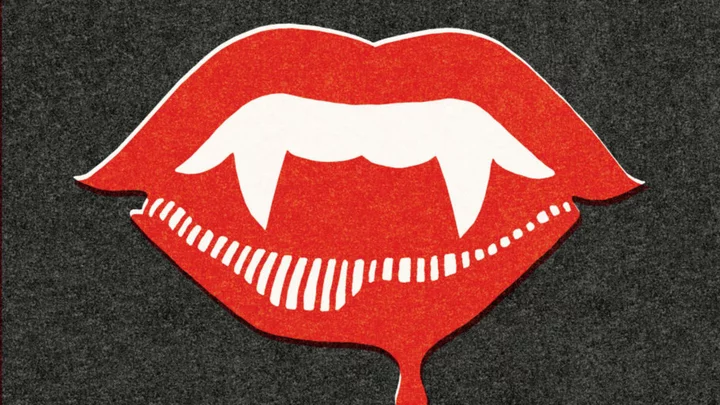NEW YORK (AP) — Lighting for the entertainment industry is Ryan Meyer's lifeblood.
Before the Hollywood strikes, he worked 40 hours a week or more as a gaffer or director of photography. He also has a company that usually earns more than a million dollars a year in production support.
Most of that is gone, for now, dried up in the contract disputes that have led to months of picket lines by writers and actors. One day recently, the 50-year-old Meyer, who lives in Los Angeles, lit an actor's home foyer, “so when she opens the door,” he said, “she looks good.”
While waiting out the strikes, Meyer and many thousands of others in the business are taking most any paycheck they can get, from Trader Joe's to teaching to hitting up friends for writing gigs. Some are turning hobbies into money. Most anything to pay the bills.
“We've become handymen,” Meyer said. “My neighbor needed help with his Jacuzzi so we powered that up for him. Somebody else bought a trailer with a saw and is cutting people's firewood.”
Side hustles are nothing new to many actors and writers. Turning them into life support is the issue now. That includes industry workers not striking but thrown out of work.
Jesse McLaren is a staff writer in Los Angeles for “Jimmy Kimmel Live!” and has written for the Oscars and the Emmys. As a hobby during the pandemic, he bought a 3D printer and began making custom snow globes featuring the houses of loved ones. He doled them out as gifts.
“They’ve become my full time living, basically,” he said.
McLaren has sold about 40 custom snow globes since the writers went on strike, at $299 a piece, through his Etsy shop.
“I’ve made the equivalent of one full mortgage payment so far this month,” he said. “I’m fully committed to snow globes right now. No joke,” he said.
As the strikes near historic records, industry funds offering help are juggling intense demand.
“In the past month our counselors have been reporting an increase in applicants facing eviction notices, utility shutoffs and mortgage foreclosures. And we know that even a quick end to the current strikes will not put an end to people’s financial hardships for quite some time,” Keith McNutt, executive director of the Entertainment Community Fund's western region, said Friday.
As of Sept. 1, the fund has distributed about $6.5 million to about 3,100 film and TV workers. It has doled out $400,000 to $700,000 a week during the strikes, compared to an average of $75,000 weekly during the first half of 2023.
Cameo, a site where celebrities record personalized video messages for fans, has seen 156% growth from July 15 to Sept. 1 from the same period a year ago. Since the writers strike began, 3,124 people joined or reactivated their Cameo accounts, the company said.
Meyer, with most of his six staff and 70 or so satellite crew members on furlough, faces a double whammy. His company was once routinely busy on commercials, which is work not impacted by the strike. Now, with that market flooded with new competition submitting miniscule budget bids, he can't compete.
“Now it's, ‘What bills get paid this month and what doesn’t?'” he said.
It's been nearly five months since members of the Writers Guild of America stopped working, and just over two months since the actors union joined them in their fight against studios and streamers.
The use of artificial intelligence has emerged as a top issue in the disputes, along with better pay, benefits and more traditional job protections. Actors fear they will lose control of their likenesses if AI is deployed. Unknown actors fear they will be replaced altogether. Writers worry they will have to share credit or lose credit to the technology.
Actor Autumn Monroe splits her time between Atlanta and New York. While walking a picket line recently in downtown Manhattan, she said she has an Alpha Kappa Alpha sorority sister to thank for helping her stay afloat during the strikes.
“She called and I was able to pick up some consulting and writing. It's for her research as part of a fellowship. I have a doctorate. She's paying me, thank God,” Monroe said.
Monroe appeared in the recently canceled reboot of “The Wonder Years” and wrapped an upcoming movie starring Vince Vaughn. In the business for 13 years, she remains on her union's health insurance and has enough banked hours to preserve her coverage for a while longer.
With the help of her sorority sister, Monroe won't have to touch her savings.
As a showrunner, writer, producer and story editor for 16 years, Shadi Petosky in Los Angeles has worked on “Parks & Recreation” and the Netflix hit “The Sandman,” among many other projects. She was busy with a development deal when the strikes hit.
Last year, Petosky made $220,000. Now, she’s an hourly worker.
“I’m doing every job I can find,” she said. “Lots of bookkeeping and administrative assistant type work. I’ve been doing some appliance repair.”
Petosky has also helped people liquidate storage units and assisted a retired professor in cataloging his work. Keeping up with her $5,000 plus in monthly expenses has been a terrifying struggle. She recently owed back rent, back child support and was behind on car payments.
“About two months into the strike I was just fully out of money,” Petosky said. “My landlord has been kind enough to defer half my rent for the duration of the strike.”
Sometimes, it's about the impacted helping the impacted.
Actor Bethany Layla Johnson in New York said on a recent picket line in New York that she has befriended on-set photographers over the years. When the actors strike began, she signed on to help them sell images to photo agencies, including celebrity-fueled rallies and picket lines in the strikes. She takes an 8% fee.
“I'm thinking about getting my notary,” she said. “New York City is a real estate city. It would be great if I could become a go-to notary for real estate brokers.”
Acting and modeling work for Briza Covarrubias had picked up significantly since 2019, when the pandemic stalled her livelihood. Her husband's salary as an engineer helps, but it doesn't get them all the way there in paying their bills.
“Right now, there's nothing. Social media has really changed the modeling industry,” she said. “My sister does work at Trader Joe’s. She offered to help, or I go back to bartending."
Covarrubias, 30, has done some unpaid stage work during the strikes that fed her hunger to act. Born and raised in Los Angeles, she and her husband had moved into her parents' converted garage with their dog during the pandemic and were in the process of moving out when the strikes hit.
“There were some awesome auditions coming through, then in March things started to slow down and my agent was like, 'There might be a strike.' Then the WGA strike happened and by June an audition a week went to nothing,” she said.
Covarrubias considers herself lucky. Her French husband, who she supported while he pursued a work visa, now has that in hand and is able to earn. His salary is about $50,000 a year. They pay her parents about $1,500 a month in rent.
“He reminds me every day, you were there for me. I’m here for you now. But, you know, we're still struggling," she said.
___
For more on the ongoing actors and writers strikes, visit: https://apnews.com/hub/hollywood-strikes/









